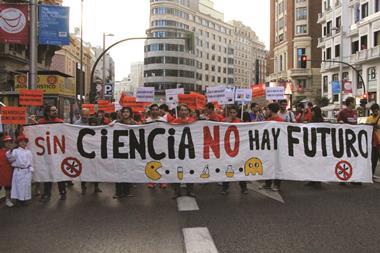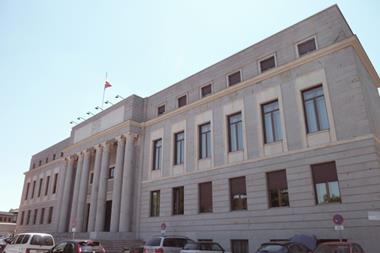Resolution of political impasse unlikely to deliver higher profile for science
Spanish researchers are sceptical that an end to the political deadlock that has gripped the country will bring relief for the country’s scientific enterprise. When new prime minister Mariano Rajoy announced his cabinet it turned out that there would be no room for a science ministry, which was abolished in 2011 when Rajoy was first elected. Science will remain under the umbrella of the ministry of economy.
The decision was perceived by scientists and linked organisations to signal Rajoy’s lack of commitment to research. While the research budget increased slightly last year, investment in R&D has dropped since the beginning of the 2008 financial crisis. Nazario Martín, president of the Confederation of Spanish Scientific Societies (COSCE), tells Chemistry World that the last five years without a science ministry have been ‘disastrous’. He says that the absence of a science minister left the area undefended during decision-making. A spokesman from the office of the secretary of state for research says that keeping science in the ministry of economy will provide it with stability.
Spanish science is now in the second division of government priorities
Nazario Martín, president of the Confederation of Spanish Scientific Societies
Nonetheless, Martín said that Secretary of State for Research, Carmen Vela, who will continue in her post, had done a good job. Martín also praises Vela’s move to turn research credits into direct state funding. However, he adds that this is not enough: ‘Spanish science is now in the second division of government priorities.’ He concludes that Spain shouldn’t be compared with other countries without a science ministry, such as the UK: ‘If funding for research was rising, we wouldn’t need a department, but unfortunately that’s not the case.’
Spanish researchers working abroad were also hoping that the slowly improving economic situation would move science up the political agenda. Emma Martínez, president of the scientific policy committee of the Society of Spanish Researchers in the UK (SRUK), agrees with Martín that science is not a priority for Rajoy. ‘It’s apparent that the government considers science an expense, and not an investment,’ she notes.
Martínez observed that a specific ministry is not ‘strictly necessary’, as long as Rajoy’s government honours its electoral promises, including helping to push total research investment to 2% of GDP by 2020. However, she says that the trend points in the opposite direction. In 2009, total research investment was 1.38% of GDP. Since then, this has fallen to 1.23% in 2014. ‘The numbers speak for themselves, and they do it loudly about the need for a science ministry.’











No comments yet